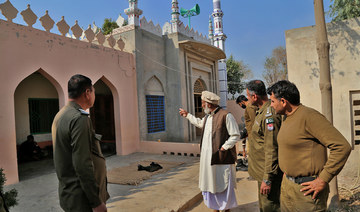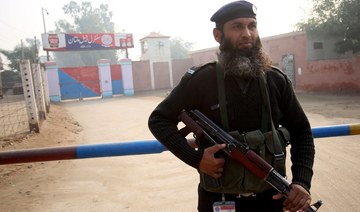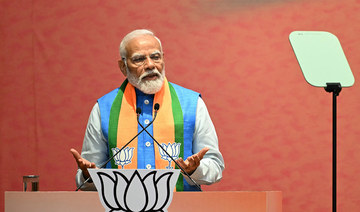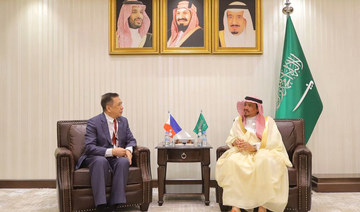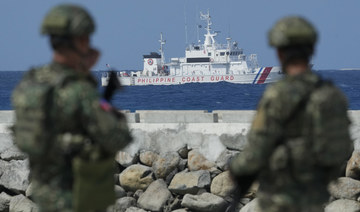MULTAN, Pakistan: An enraged mob stoned to death a middle-aged man for allegedly desecrating the Qur’an in a remote village in eastern Pakistan, police said Sunday.
The custodian of a local mosque said he saw the man burning the Muslim holy book inside the mosque Saturday evening and told others before informing police, according to police spokesman Chaudhry Imran. The violence took place in a village in the district of Khanewal in Punjab province.
Imran said police rushed to the scene, where a man was found surrounded by an angry crowd. Officer Mohammad Iqbal and two subordinates tried to take custody of the man but the group began throwing stones at them, seriously injuring Iqbal and slightly injuring the other two officers.
Munawar Gujjar, chief of Tulamba police station, said he rushed reinforcements to the mosque but they did not arrive before the mob had stoned to death the man and hung his body from a tree.
Gujjar said the victim was identified as Mushtaq Ahmed, 41, of a nearby village.
“The ill-fated man has been mentally unstable for the last 15 years and according to his family often went missing from home for days begging and eating whatever he could find,” he said. He said the body was handed over to the family.
Mian Mohammad Ramzan, the mosque custodian, said he saw smoke inside the mosque, which is adjacent to his home, and rushed over to investigate. He found one Qur’an burned and saw a man attempting to burn another. He said people were starting to arrive for evening prayers as he was shouting for the man to stop.
Witnesses said a police team that reached the village before the stoning began took custody of a man but the mob snatched him away from them and beat the police as they tried to rescue him.
Later, more officers and constables reached the scene and took custody of the body, they said.
Gujjar, the area police chief, said investigators were scanning available videos to try to identify the assailants. He said police had so far detained about 80 men living in the mosque’s surroundings but that about 300 suspects took part.
Prime Minister Imran Khan expressed his anguish over the incident and said he was seeking a report from Punjab’s chief minister on the police handling of the case. He said they “failed in their duty.”
“We have zero tolerance for anyone taking the law into their own hands and mob lynching will be dealt with with the full severity of the law,” he said in a tweet hours after the incident.
Khan also asked the Punjab police chief for a report on the actions taken against perpetrators of the lynching.
The killing comes months after the lynching of a Sri Lankan manager of a sporting goods factory in Sialkot in Punjab province on Dec. 3 who was accused by workers of blasphemy.
Mob attacks on people accused of blasphemy are common in this conservative Islamic nation. International and national rights groups say blasphemy accusations have often been used to intimidate religious minorities and settle personal scores. Blasphemy is punishable by death in Pakistan.
Man accused of blasphemy stoned to death by mob in Pakistan
https://arab.news/zs5a8
Man accused of blasphemy stoned to death by mob in Pakistan
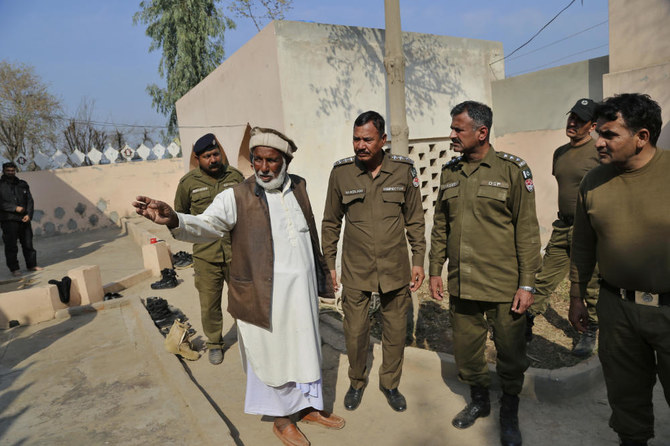
- The ill-fated man has been mentally unstable for the last 15 years and according to his family often went missing from home for days begging and eating whatever he could find,” he said
Ukraine’s first lady and foreign minister visit Russia-friendly Serbia

- Although Serbia has condemned the Russian aggression on Ukraine, it has refused to join international sanctions against Moscow
BELGRADE, Serbia: Ukrainian Foreign Minister Dmytro Kuleba made a surprise visit to Russia-friendly Serbia on Monday, together with Ukraine’s first lady, Olena Zelenska, in a sign of warming relations between the two states.
On his first visit to Serbia since the start of the Russian aggression on Ukraine in 2022, Kuleba met Serbian President Aleksandar Vucic and new Serbian Prime Minister Milos Vucevic, whose government includes several pro-Russian ministers, including two who have been under US sanctions.
A statement issued by the prime minister’s office after the talks said that “Serbia is committed to respecting international law and the territorial integrity of every member state of the United Nations, including Ukraine.”
Although Serbia has condemned the Russian aggression on Ukraine, it has refused to join international sanctions against Moscow and has instead maintained warm and friendly relations with its traditional Slavic ally.
Serbia has proclaimed neutrality regarding the war in Ukraine, and its authorities repeat that Serbia does not supply weapons to any parties. However, there are reports that Serbia has delivered weapons to Ukraine through intermediary countries. The visit by Kuleba and Zelenska, who toured the Serbian capital with Serbian first lady Tamara Vucic on Sunday, was met with criticism in Moscow. Comments by readers in the Russian state-run media such as “shameful” were published by RIA Novosti.
In what appears to be damage control, soon after his talks with Kuleba on Monday, Vucevic was to meet the Russian ambassador to Belgrade and the two were to tour a big storage facility for Russian gas that is being imported to Serbia.
Pro-Russian President Vucic has informally met Ukrainian President Volodymyr Zelenskyy three times on the sidelines of international conferences. Serbia has supplied Ukraine with humanitarian and financial aid.
Vucic has for years claimed to follow a “neutral” policy, balancing ties among Moscow, Beijing, Brussels and Washington. Although he has repeatedly said that Serbia is firm on its proclaimed goal of seeking European Union membership, under his authoritarian rule the Balkan country appears to be shifting closer to Russia and especially China.
During a high-stakes visit by Chinese President Xi Jinping to Belgrade last week, China and Serbia signed an agreement to build “ironclad” relations and a “shared joint future.”
Modi’s BJP skips Kashmir as Indian election enters fourth phase

- Millions of Indians across 96 constituencies began voting on Monday
- Ruling party is not fighting elections in Kashmir for first time in 30 years
NEW DELHI: India’s ruling Bharatiya Janata Party is not contesting elections in the Muslim-majority region of Kashmir for the first time in nearly three decades, as voting in the latest round of the national polls got underway on Monday.
The world’s most populous country began voting on April 19 in a seven-phase election that is scheduled to take place over six weeks, with ballots set to be counted on June 4.
India has 968 million people eligible to vote in the general election, where incumbent Prime Minister Narendra Modi and his Hindu nationalist BJP are aiming for a rare third consecutive term in power.
Monday’s voting involved 96 constituencies in the fourth round of polling.
While the BJP, which has been in power since 2014, and its allies are contesting every other part of India as they look to secure a majority of the 543 parliamentary seats, the party is sitting out in the northern Himalayan territory of Jammu and Kashmir.
This year marks the region’s first election since Modi’s government stripped the valley of its special autonomous status and statehood — which was granted by the Indian Constitution — on Aug. 5, 2019. The move unilaterally revoked the relevant provisions under Article 370, scrapping Kashmir’s flag, legislature, protections on land ownership and fundamental rights, sparking fears of demographic engineering in the region.
“It’s really surprising that the BJP, which claimed to have over 800,000 cadres in the valley, failed to find a single candidate. It shows that the BJP is not popular in the valley,” Sanjay Tickoo, the Srinagar-based leader of the Hindu minority group Kashmiri Pandit, told Arab News.
“I am expecting a record turnout to show the central government what (they) have done to the people of Jammu and Kashmir. This is the reflection of anger … no one is happy in the valley after the abrogation of Article 370.”
Indian-controlled Jammu and Kashmir is part of the larger Kashmiri territory, which has been the subject of international dispute since the 1947 partition of the Indian subcontinent into Hindu-majority India and Muslim-majority Pakistan. Both countries claim Kashmir in full and rule in part.
Modi said his government had been focusing on jobs and development as part of an effort to end violence in the valley, which has for decades witnessed outbreaks of separatist insurgencies to resist control from the government in New Delhi.
But after the BJP lost Kashmir’s three seats in the 2019 election, the party’s popularity slid further after it revoked the region’s autonomous status later the same year and subsequently imposed months of strict communication blockade and jailed hundreds of political leaders.
“The vote expresses not only anger but also apprehension against the anti-Muslim rants that have been going on as well as whatever they have done in Kashmir,” Professor Sheikh Showkat, a Srinagar-based political analyst, told Arab News.
Altaf Thakur, BJP spokesperson in Kashmir, said the party was still taking part in the Kashmir polls by supporting other regional parties.
“It is not correct to say that we are not fighting the election, we are playing the role of kingmaker and whichever way the cadres of the BJP will go, we will win,” he told Arab News.
“It’s not important whether we stand in the elections or not, the important thing is that we have to defeat the dynasty rulers,” he said, referring to the main contenders in the Kashmir polls, the National Conference and People’s Democratic Party.
While they are fighting each other in the valley, both parties have said they oppose the BJP and are part of the Congress party-led opposition alliance, known as India.
For some Kashmiri voters, Monday’s vote was about speaking up for themselves.
“The BJP knew that they cannot tolerate the wrath of the people of Kashmir. They fled the contest without a fight,” Aijaz Ahmed, a businessman from Srinagar, told Arab News.
“I voted today because it gave me an opportunity to express myself and tell the government in Delhi that you cannot keep us silenced. We want an atmosphere without fear and a region where our own identity is not questioned.”
5,000 Filipino pilgrims expected to fly to Makkah for Hajj

- Travelers ‘can expect VIP-like treatment,’ National Commission on Muslim Filipinos says
- First pilgrims will take off from Manila International Airport next week
MANILA: Thousands of Filipino pilgrims are set to travel to Makkah for the upcoming Hajj pilgrimage, the National Commission on Muslim Filipinos said on Monday, with the first batch set to leave for Saudi Arabia next week.
In the predominantly Catholic Philippines, Muslims constitute about 10 percent of the nearly 120 million population. Most live on the island of Mindanao and the Sulu archipelago in the country’s south, as well as in the central-western province of Palawan.
The commission said that nearly 5,000 Muslims had confirmed they would travel to Saudi Arabia to perform the Hajj pilgrimage this year.
“We have already processed 96 percent of the pilgrims,” Zainoden Usudan, chief of Hajj operations at the NCMF’s Bureau of Pilgrimage and Endowment, said.
“They can expect VIP-like treatment, allowing them to fully concentrate on their pilgrimage.”
Officials from the commission have been working hard to ensure that the difficulties faced by pilgrims last year will not be a problem this time around.
“This time, we are making sure that food will not be a problem,” Usudan said, referring to problems with delayed meal deliveries in 2023.
He said the commission was working with a service provider in the Kingdom that had contingency plans for all aspects of the trip, including transportation.
The first Hajj flight from the Philippines is set to take off from Manila International Airport on May 23.
One of the five pillars of Islam, this year’s Hajj is expected to run from June 14-19. Many pilgrims extend their stays to make the most of the once-in-a-lifetime opportunity to fulfill their religious duty.
Charities brand UK family reunion system for asylum-seekers ‘broken’

- New report says thousands waiting for relatives to be relocated to Britain
- Refugee Council CEO: ‘The UK has clearly failed the Afghan refugees that it promised to protect’
London: Charities in the UK have branded the country’s system for reuniting separated families of asylum-seekers “broken,” calling for the Home Office to “fix and expand” it.
A new report published by the Refugee Council and Safe Passage International has highlighted figures showing a backlog of more than 11,000 migrants in the UK waiting to be reunited with relatives during the summer last year.
Despite repeated freedom of information requests, the Home Office has not provided updated figures since then.
The report mentioned that a particular problem faces separated Afghan families, with many individuals reaching the UK but finding themselves in prolonged legal difficulty and their relatives forced to remain in Afghanistan, neighboring Pakistan or elsewhere.
Currently, Afghans evacuated from their country as part of Operation Pitting in August 2021 are prevented from automatically bringing close family to the UK.
In October 2023, the British government proposed a new system to address this issue, but the plan has yet to implemented despite pressure from MPs and members of the House of Lords.
Approved asylum-seekers can apply for a family reunification visa, but thousands find themselves stuck in a backlog of cases despite the Home Office saying the process should take under 12 weeks.
The Independent spoke to a number of Afghans, including a former pilot, struggling to be reunited with their relatives.
The pilot told the newspaper: “They (his family) have been waiting for a visa for five months in Iran, but so far there is no news from the embassy and there is no guarantee it will be issued.
“My family are facing a lot of problems. They don’t have a proper place to live, and don’t have access to a doctor, because they are living illegally.
“Their Iranian visas have expired and they need to extend them, but it is impossible. My wife is suffering mentally and emotionally, and she is completely (without hope).”
Another issue is that of unaccompanied children who, under current rules, also cannot use their status to automatically relocate their families to the UK.
The Independent spoke to one Afghan teenager, Farhad, rescued from Kabul without his parents in 2021, who faces an anxious wait to see if his family can join him in the UK.
“(The UK government) promised in 2021 that they’re going to bring the families, but it’s still been almost three years,” he said.
“My mum and my siblings are in Pakistan because they needed a doctor and medication. But my father couldn’t get the visa to go with them.
“I am doing my GCSEs this month and I can’t really focus on my studies knowing that my family is struggling.”
Safe Passage International highlighted the case of another young boy, Ahmad, who had tried to join his older brother in the UK.
Despite both his parents having died in Afghanistan, the Home Office denied that he had any “serious and compelling” circumstances to justify his asylum application.
He was only able to stay in the UK after a judge intervened, ordering the Home Office to provide assistance.
Safe Passage International’s CEO Dr. Wanda Wyporska told The Independent: “Nearly three years on, it’s a national shame that Afghans, who risked so much to support UK military operations, are still waiting for a way to bring their family to safety here with them. Their family members are living in fear every day of the Taliban.”
The Refugee Council’s CEO Enver Solomon said: “The UK has clearly failed the Afghan refugees that it promised to protect, by keeping families separated for so long with no information on how they may be reunited.
“After risking everything for the UK, Afghans and their families should not be forced to make dangerous boat journeys to get here, nor should they face hostile, inhumane policies like the Rwanda plan when they do make it to the UK.”
A Home Office spokesperson told The Independent: “We made one of the largest commitments of any country to support people from Afghanistan, and so far we have brought around 27,900 individuals to safety in the UK, including thousands under our Afghan resettlement schemes.
“In October we committed to establish a route for those evacuated from Afghanistan under Pathway 1 of the Afghan Citizens Resettlement Scheme without their immediate family members, to reunite them in the UK.
“We remain on track to meet that commitment and open the route for referrals in the first half of this year.”
Philippines to tighten guard at locations in South China Sea

- Philippine Coast Guard deploys ship to Sabina Shoal on the Spratly archipelago, where it accused China of building an artificial island
MANILA/BEIJING: The Philippines said on Monday it would keep a closer guard on reefs, shoals and islets in its exclusive economic zone in the South China Sea, alarmed by reports of new reclamation activities by China, which Beijing denied.
The Philippine Coast Guard said on Saturday it had deployed a ship to Sabina Shoal on the Spratly archipelago, where it accused China of building an artificial island, having documented what it said were piles of dead and crushed coral on the sandbars.
Jonathan Malaya, spokesperson of the National Security Council (NSC), said NSC chief Eduardo Ano had ordered a tighter guard at locations within Manila’s 200-nautical mile economic zone, as a long-standing diplomatic row with Beijing intensifies.
“No one will guard (these locations) except us. It is our responsibility under international law to guard (them) and ensure that the environment there would not be damaged and that there won’t be reclamation activities,” Malaya told a regular television program.
China claims almost all the South China Sea, including parts claimed by the Philippines, Brunei, Malaysia, Taiwan and Vietnam, and has carried out extensive land reclamation on some islands, building military facilities, causing concern in Washington and the region.
China’s foreign ministry on Monday dismissed Manila’s latest accusation as “groundless and pure rumor.”
“Recently, the Philippine side has repeatedly spread rumors, deliberately smeared China and attempted to mislead the international community, which is futile,” spokesperson Wang Wenbin told a regular briefing.
He urged Manila to “return to the right track of properly settling maritime disputes through negotiation and consultation.”
Philippine Coast Guard spokesperson Jay Tarriela said its presence at the Escoda shoal had deterred China from doing small-scale reclamation, but that scientists would have to determine whether the piles of coral were natural or man-made.
He said the coast guard was committed to maintaining a presence at the shoal, just over 120 nautical miles from the Philippine province of Palawan.
The Permanent Court of Arbitration ruled in 2016 that Beijing’s claims in the South China Sea, a vital waterway, had no basis under international law, a decision that China rejects.
The Sabina Shoal, known locally as Escoda, is the rendezvous point for vessels resupplying Filipino troops stationed on a grounded warship at the Second Thomas Shoal, where Manila and China have had frequent run-ins.
Ano has called for Chinese diplomats to be expelled over the alleged leak of a phone conversation with a Filipino admiral about the maritime dispute.
On Monday, the Philippine foreign ministry said it would look into reports of “illegal and unlawful activities” by diplomatic officials, but did not name China.



